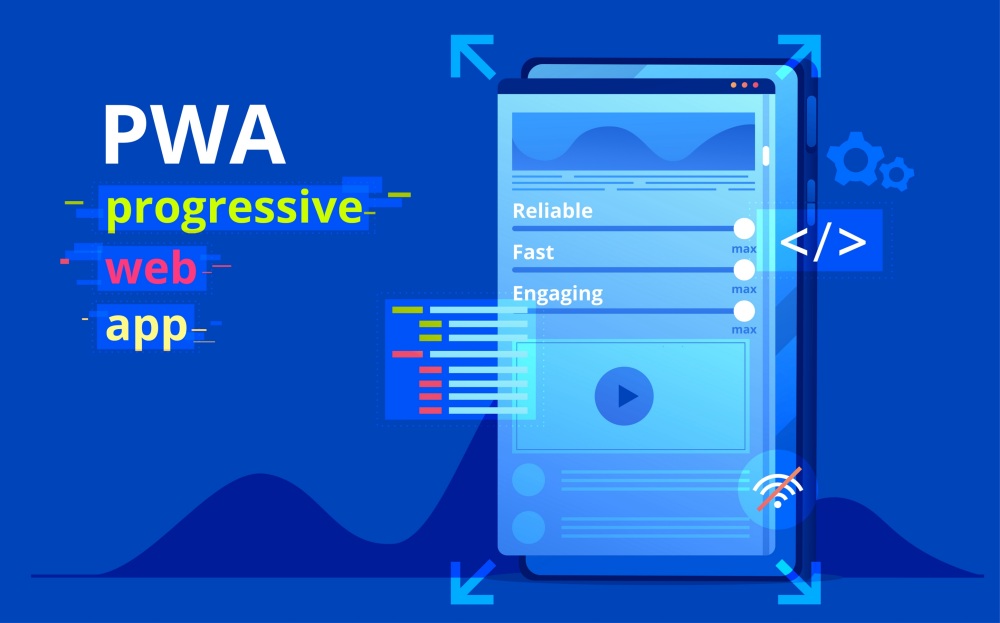Progressive web apps accelerate the website experience, making them faster, more interactive, and more reliable. Hence, as we move into 2024, the demand for these intuitive apps is increasing daily. If you’re among those who seek to create PWA, considering the right framework is the key. Therefore, this article will guide you about the best progressive web app framework for generating responsive web applications.
Top 10 PWA Frameworks to Build Progressive Web Applications
Selecting the right one when considering the progressive web app framework is paramount. Thus, some frameworks offer you high-end tools and features to create robust apps.
1. React
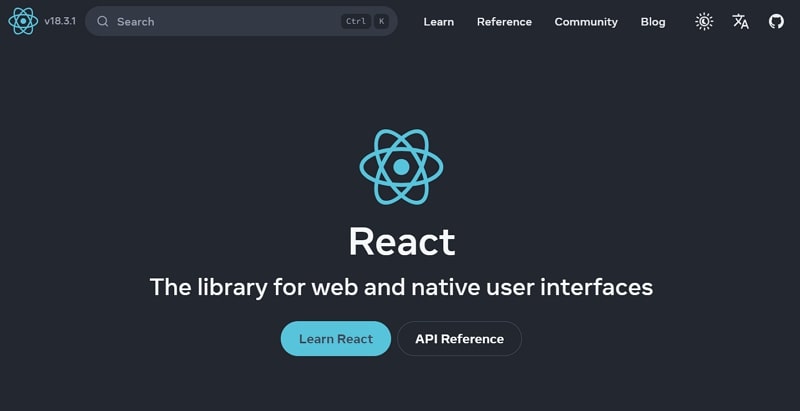
React is a top-notch framework developed by Facebook to cater to developers’ diverse needs. Leveraging virtual DOM, this JavaScript framework ensures updates in actual DOM for speedy rendering in web apps. It also supports built-in offline functionality that allows users to load apps even when they have connectivity issues.
Moreover, you won’t have to create a web page from scratch, as it can be easily inserted into an existing HTML page. So, all such features make this framework an ideal choice for developing single- and multi-page applications.
Pros
- Its state management capabilities allow it to streamline the intriguing requirements of web apps.
- With its reusable modular components, you can easily save time in web app development to ensure consistency across platforms.
- Using its extensive libraries, one can generate responsive web apps, saving time and effort.
Cons
- React’s large library usage can be daunting for developers, especially for beginners.
- To develop a progressive web app with React, developers need basic JSX knowledge.
2. AngularJS
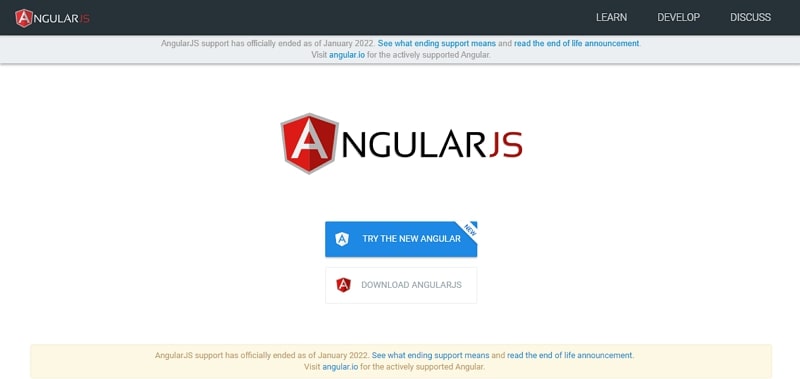
Another best framework for progressive web apps is AngularJS, which has an intuitive UI component to create a complex web app. Developed by Google, this framework also features virtual DOM that boosts the overall performance of web apps. In addition, it comes with directives through which you can create new HTML syntax for apps.
Other than that, there are reusable components to hide the complex DOM structures, letting you focus on the app’s actual usage. To ensure accessibility across platforms for enhanced user experience, use its locale-aware filter and stemming directives.
Pros
- AngularJS is less complex than other frameworks, enabling you to tailor the features to suit your needs.
- Users can easily bookmark and email links to certain locations within the app using its deep linking capability.
- Its end-to-end scenario runner eliminates the test flakiness issue to offer consistent performance across platforms.
Cons
- Compared to other frameworks, Angular Syntax requires longer coding, which can affect the code readability for some developers.
- Besides, each syntax comes with certain rules and patterns that require thorough understanding.
3. Ionic
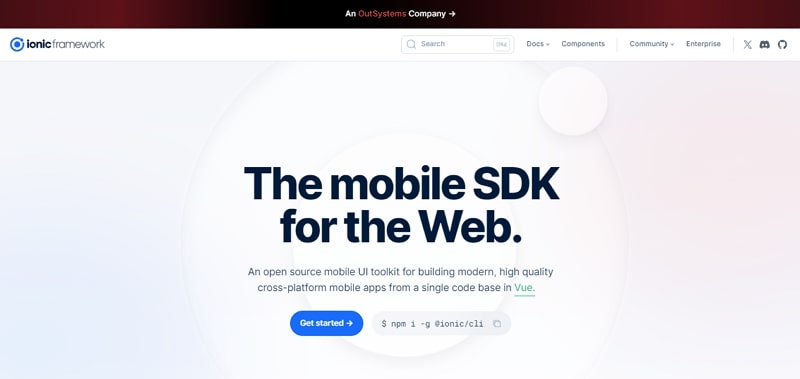
Ionic is one of the best progressive web app frameworks, as it is compatible with other frameworks like Angular or React. So, this platform allows you to create user-friendly UI components for all the major platforms under a single code base. This not only ensures consistency but also offers the ease of reduced development and management costs.
Featuring a robust command-line interface, Iconic enables developers to create, test, and deploy apps, making cross-platform development straightforward. The best part is that you can use any JS framework CLI to enhance productivity when building dynamic apps.
Pros
- There is the on-device hot fresh feature through which developers can instantly review the changes without restarting the app.
- With this, users can also access native device functionality to enable plugins like Camera and GPS in PWAs.
- Using its capacitor bridge, one can deploy apps on iPhone and Android to create cross-platform apps with native APIs.
Cons
- Some developers might find performance issues while using on-device hot fresh, enabling them to rely on live reloading.
- In addition, using native plugins can be a task that requires an extensive learning curve.
4. Polymer
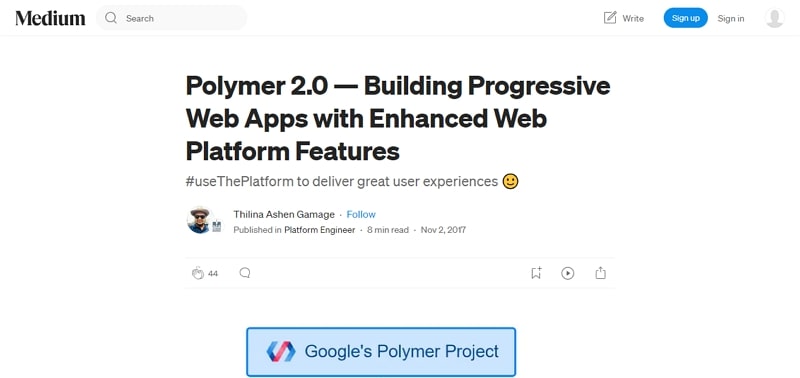
While developing PWAs, one needs to ensure data integrity, which is why Polymer offers a secure HTTPS protocol to safeguard data in transit. With this progressive web app framework, navigation will be seamless since it offers an app-like feel. Additionally, there is a wide range of templates that simplify the process of web app generation for developers.
Moreover, using its reusable UI components, developers can create efficient and progressive user interfaces. Regardless of internet connectivity, Polymer service workers ensure offline functionality so that users can easily access and interact with apps.
Pros
- Polymer is highly customizable, allowing you to tailor the interface to suit your needs and preferences.
- The framework is easy to use and understandable, eliminating the need for a learning curve.
- Using Polymer, developers can create an app that is easily compatible with modern device browsers.
Cons
- If you are considering this framework to design large and complex applications, it lacks an official IDE.
- Users might face issues with limited server-side rendering, which affects SEO and causes longer reloading times.
5. Vue.js
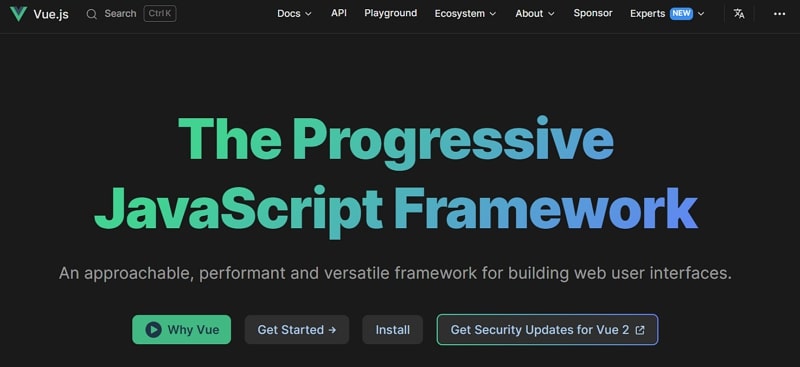
If you seek a framework that enables you to create large and complex PWAs, Vue.js is the ideal choice. The best part of this PWA framework is its flexibility and versatility, allowing you to tailor the user interface to your preferences. In addition, its virtual DOM ensures that apps can be accelerated for a better user experience.
Furthermore, the reactivity system in this framework guarantees that the data is fast and accurately displayed on the user interface. This advanced framework eliminates the hassle of page reloading, which is the major issue developers face while creating complex apps.
Pros
- Compared to other frameworks, using Vue.js is straightforward and requires no prior knowledge to generate apps.
- Developers can easily manage and optimize Vue.js applications by offering tools like Vue CLI.
- Plus, the Vue Router aids users in generating single-page applications with multiple views.
Cons
- Unlike other frameworks like React and Angular, Vue.js has a smaller community.
- Due to the smaller ecosystem, finding the developer to generate PWAs can be challenging for users.
6. ScandiPWA
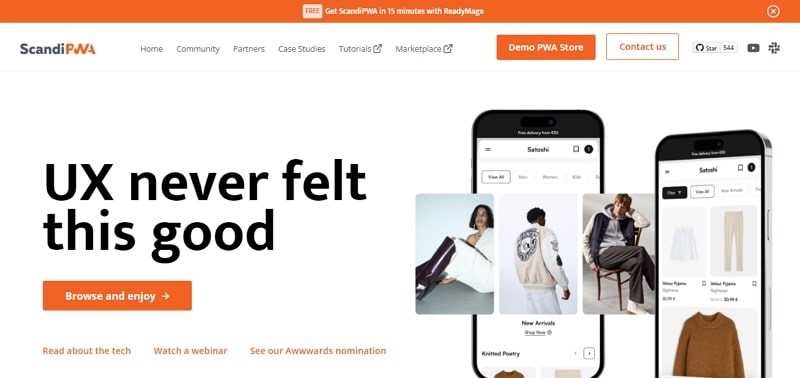
ScandiPWA is a framework based on Magento PWA Studio that enables you to create web apps by utilizing the Magento eCommerce platform. With this framework, users can customize the user interaction to match their business needs. Moreover, they can embed reusable extensions in PWA to create a consistent user experience across platforms.
Regarding framework syntax, they are simple and comprehensible, making it easy for all skills developers to adopt this framework. Not just that, with its light code bundles, you can improve the app performance by limiting the reloading time.
Pros
- This framework for progressive web apps is best for creating lightweight and simple applications.
- Additionally, with its efficient catalog management, users can maintain their app to ensure an accurate and up-to-date presentation.
- One can improve efficiency and reduce workload by considering Magento’s infrastructure for web app generation.
Cons
- Leveraging over 511 GitHub issues, users might face community management issues while generating PWAs.
- As this framework is tied to Magento’s infrastructure, it limits the tailoring needs and affects the custom solutions for developers.
7. PREACT
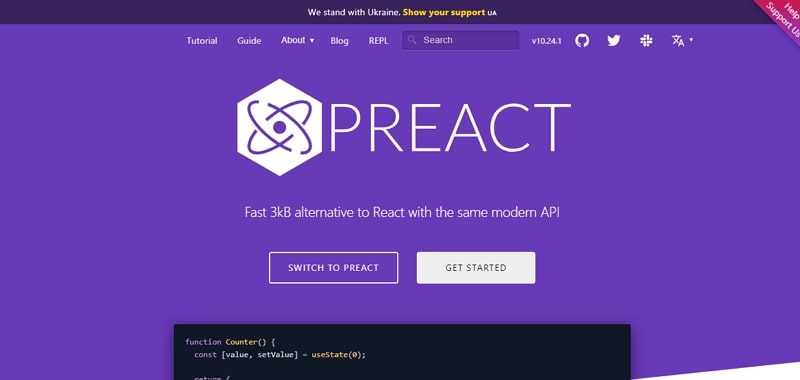
This framework is similar to React but smaller and faster because of its Virtual DOM, which ensures fast application processing. If you are new to development and desire to learn how to build PWAs, this PWA framework is easy to use and offers zero learning curve.
Other than that, the apps generated via PREACT are interactive and run faster on any browser. Users can also use the same UI components, like React, to boost the user experience on your applications. As far as compatibility is concerned, you can use ES6 APIs to improve code readability and functioning.
Pros
- Being a lightweight and swift framework, this is the best progressive web app framework for creating small applications.
- Using PREACT CLI, developers can create app actions with ready-to-use settings, making development easier.
- PREACT is portable and embeddable, meaning you can easily take virtual DOM to a new app without integration issues.
Cons
- This framework does not support context yet, meaning sharing data across components is challenging for developers.
- This framework relies on browser APIs to create large web applications and lacks React’s synthetic event implementation.
8. PWA Builder
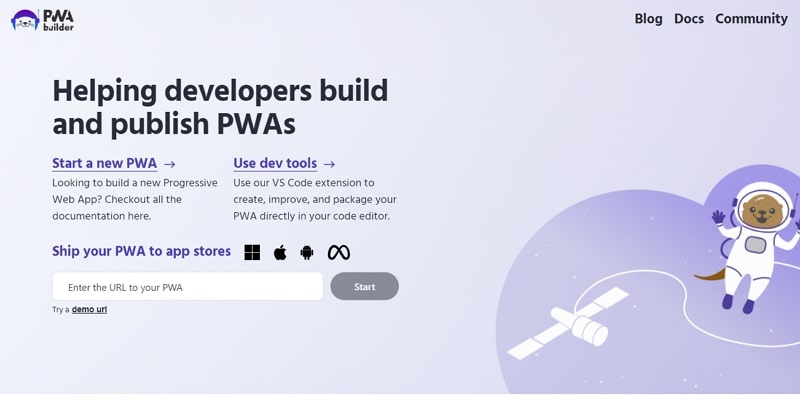
Founded by Microsoft, PWA Builder is the finest solution for converting responsive websites to progressive web apps with minimal effort. Using this progressive web app framework, developers can simply enter the site URL to generate PWA components, making development straightforward. In addition, there is a file manifestation generation feature that offers in-depth details about the applications, such as themes or colors.
Using these details, users can determine whether the website meets certain needs. Furthermore, PWA Builder is compatible across all platforms with offline functionality, meaning that the apps can be easily accessed in low connectivity environments on any device and browser.
Pros
- With built-in testing tools, developers can monitor the application’s performance to ensure it functions accurately.
- Offering multiple deployment options, one can publish their progressive web app on the Microsoft Store or any other platform.
- PWA Builder community support is active and helpful, assisting developers with questions and giving feedback.
Cons
- Though PWA Builder can create a wide range of components automatically, you can’t customize them to match your needs.
- The PWA building support offered by this PWA framework is basic, limiting the need to create complex applications.
9. Flutter
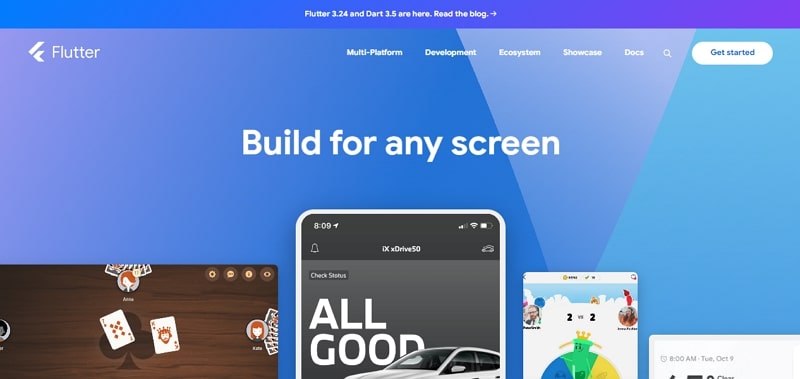
Another open-source PWA framework on the list of Flutter reduces development time by letting users create a single codebase for various platforms. It features a wide range of UI components, enabling users to personalize them to generate visually appealing interfaces. If you want to see the changes made in the code, use its hot reload without losing the original codes.
Moreover, with its native ARM code, you can ensure the high performance of web applications across platforms for a better user experience. You can also utilize this framework to access native device capabilities like camera, storage, and GPS for better functionality by using its native set of plugins and packages.
Pros
- You can develop apps for multiple platforms using a single codebase, reducing development and management costs.
- There are numerous debugging tools that you can use to verify the application is free from errors and bugs.
- Moreover, Flutter has strong community support that continues to evolve in this rapidly growing technology landscape.
Cons
- Unlike JavaScript or Swift, Flutter uses the Dart programming language, which is not widely known and adopted by developers.
- Besides, developers might face performance issues in their apps because of the large size.
10. Svelte
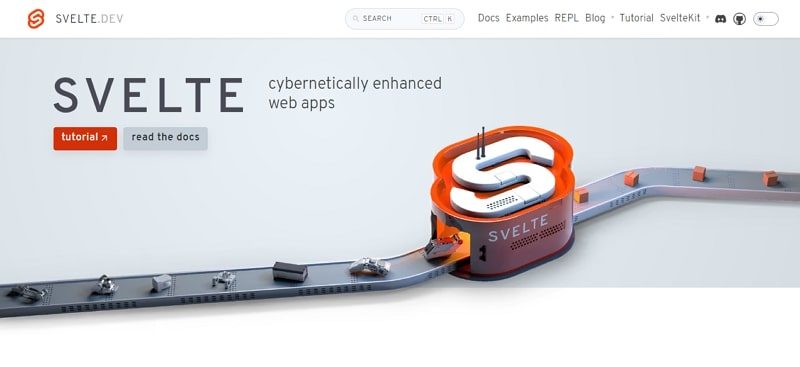
Sevelte is among the best frameworks for progressive web apps because of its declarative syntax that matches HTML. Using this, developers can easily create and maintain progressive web applications without getting confused due to syntax.
Not just that, this framework has built-in state management capabilities that eliminate the need to consider third-party libraries like Redux. Besides, you can utilize its PWA’s single file component to ensure consistency and better organization. This will enable you to access HTML, JavaScript, and CSS in one file, making it easier to understand the codebase.
Pros
- If you change a variable in the Svelte, the UI components will automatically update you to improve code readability.
- To make your app more engaging, utilize its animation and transitions to make appealing content.
- No matter the app you create with this framework, the generated PWAs will be lightweight, fast, and reliable.
Cons
- Although Svelte’s syntax is comprehensible, some of its concepts, such as reactivity and the compilation process, require learning.
- Compared to other PWA frameworks, debugging in the Svelte applications can be a task for developers.
How to Choose the PWA Framework?
Since you know about progressive web app frameworks, this section covers factors that you need to consider before choosing one. These considerations make choosing the right framework to generate responsive apps seamless.
- Ease of Use and Learning Curve: When choosing a PWA framework, determine how easy it is to use and learn. Many frameworks are beginner-friendly with the best community support, while others require a learning curve and in-depth knowledge of programming languages.
- Performance and Optimization Features: In addition, ensure the framework you are selecting is reliable, fast, and optimized for all devices. This will guarantee a smooth user experience, especially in areas that face connectivity issues.
- Compatibility With Your Tech Stack: Furthermore, verify whether the framework for the progressive web app you are considering is compatible with your tech stack. This is important because choosing an adaptable framework will make the development procedure seamless.
- Community and Long-Term Support: Finally, choose a framework that offers extensive customer support to ensure your app remains secure and up to date. Switch to frameworks with a larger user base that supports extensive plugins and solutions for common problems.
Integrating ZEGOCLOUD into Your PWA Framework for Enhanced Experience
With ZEGOCLOUD pre-designed UI components, you can make developing your progressive web app seamless. Through this, you can create an intuitive interface that makes tool navigation for users of all experiences. Leveraging its third-party cloud storage API, you can allow your users to store files on third-party services such as AWS.
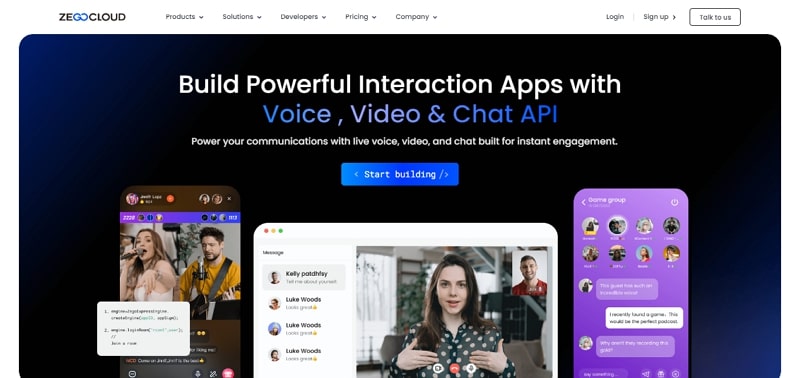
When building such web apps, users can integrate advanced features, such as live streaming and video calling for better user experience. Furthermore, this platform lets you embed customizable layout SDKs in your application, letting users tailor the interface per their needs.
While integrating features using the best progressive web app framework, you can also consider ZEGOCLOUD to achieve a low latency of 79ms. This will ensure a smooth user experience with minimal delays during conversations. All in all, this platform automates and fastens the development task while creating web apps.
Why Choose ZEGOCLOUD for Your PWA?
ZEGOCLOUD offers highly flexible and scalable solutions that can enhance the user experience of your PWA. Some of the standout features include:
- Real-Time Communication (RTC): Integrate voice, video calls, and messaging functionalities with minimal setup.
- Live Streaming: Add high-quality live video streaming for events, webinars, or gaming.
- Cross-Platform Compatibility: ZEGOCLOUD SDKs support a wide range of platforms, including web browsers, mobile, and desktop.
- Optimized Performance: Low latency and jitter management ensure a smooth user experience, even in challenging network conditions.
Use Cases for ZEGOCLOUD in PWAs
Integrating ZEGOCLOUD into your PWA opens up a wide range of use cases that can greatly enhance user engagement:
- Online Education: Real-time audio and video capabilities allow educators to interact with students through live virtual classrooms.
- Customer Support: Add real-time chat and video calls to provide instant support to users within your PWA.
- Social Streaming: Empower users to host and join live streams, creating interactive social platforms within your PWA.
- Gaming: Integrate in-game voice chats and video streaming to enhance the multiplayer gaming experience.
By integrating ZEGOCLOUD into your PWA framework, you can significantly boost the interactivity and engagement of your application. Whether it’s adding video conferencing, live streaming, or real-time messaging, ZEGOCLOUD provides a versatile and efficient solution that scales with your application’s needs. The flexibility of ZEGOCLOUD SDKs combined with the performance and reach of PWAs offers an enhanced experience that meets the demands of modern web users.
Conclusion
In a nutshell, progressive web apps are designed to enhance the user experience. Therefore, if you want to create an innovative PWA, this guide has explored the 10 best progressive web app frameworks for detailed guidance. To help you more in developing PWA, we have also discussed how ZEGOCLOUD can streamline your PWA development.
Read more:
FAQ
Q1: What are the core features of a PWA framework?
Core features include responsive design, offline functionality via caching, push notifications, and the ability for users to install the app on their home screen. PWAs also offer fast loading through caching strategies.
Q2: Why choose a PWA framework for application development?
PWAs offer cross-platform compatibility, no need for app store distribution, offline capabilities, and lower development costs since only one app is needed for web, mobile, and desktop.
Q3: What are some popular frameworks for building PWAs?
Service Workers run in the background to manage network requests, enabling offline access, push notifications, and background sync, improving app performance and reliability.
Let’s Build APP Together
Start building with real-time video, voice & chat SDK for apps today!









